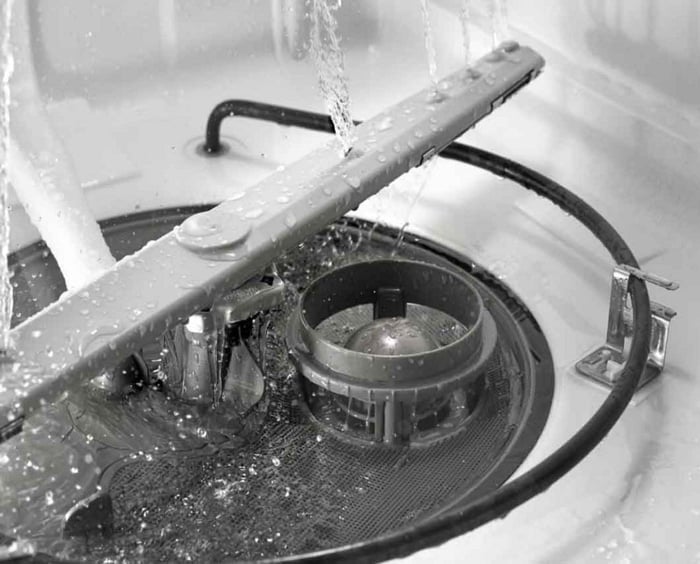We've independently reviewed this article to make sure it's as accurate as we can make it.
To find out more about our article creation and review process, check out our editorial guidelines.
Wondering how much does it cost to run your dishwasher?
Understanding the cost of operating your dishwasher is crucial to managing your budget effectively. Luckily, you’ve come to the right place for answers!
On average, running a dishwasher costs around $0.2c per cycle. However, the cost of operating your dishwasher will vary depending on its size, the selected program, and the electricity cost in your area.
Ready to learn more? Let’s dive in!
Why trust us? This article was written in collaboration with two appliance repair experts: James Blackford & Andy Fulencheck. We have over 25 years of combined appliance repair experience – please see our profiles to learn more about our backgrounds.
How to Use the Dishwasher Cost Calculator
The above calculation is based on the average wattage of a dishwasher and the average cost of electricity in the USA.
So to know your dishwasher’s electricity usage, please plug in:
- The size of your dishwasher.
- The types of loads you run (these two answers will help determine the wattage you use).
- Your local electrical costs, which will calculate your cost per cycle. Click here to know the electricity cost in your state, or refer to your latest bill.
- How many loads a week you run.
You now know either how much running your dishwasher for a month or a year will cost. You can also use my calculation above to determine how much it would cost per week or day if you want to get more granular.
Dishwasher Saving Tips
Now that you know how much it costs to run your dishwasher, it’s important to learn different ways to make the most out of it and save some extra money.
Here are three things to remember:
#1 Load Your Dishwasher Correctly
In my experience, you can reduce your dishwasher’s running costs by making sure you’re loading your dishes correctly.
By properly loading your dishwasher, you can fit more items in each load and ensure they get thoroughly cleaned during the wash cycle, avoiding the need for rewashing.
The water needs to reach the dirty side of your dishes, so make sure your dishes are facing toward the center and avoid blocking the soap dispenser or spray arms with large pans or bowls. It’s best to place large items at the back.
You might think cups and glasses go over the tines, but they go between them to minimize water spots and the chance of breakage.

When loading cutlery in the basket, forks go in tines up, knives go in blade down, and spoons go in both ways, so they don’t nest together and block each other.
Keep in mind that it’s actually best to hand wash large knives. You see, sometimes they don’t fit in the silverware rack, so people lay them across the top rack. Unfortunately, this practice can strip the coating away and cause the rack to rust prematurely.
#2 Keep Your Dishwasher Clean
Regular cleaning can also reduce the running costs of your dishwasher, prevent performance issues, and extend its lifespan.
You see, over time, food particles and mineral deposits can accumulate inside your dishwasher, affecting its performance and leading to the need for additional cycles.
Remove any debris from the bottom of your dishwasher and spray arm regularly. If there’s a significant buildup, try soaking the spray arm overnight in a vinegar solution to break up the buildup.

It’s also important to clean your filter once a month with hot soapy water. You can even use a wire or stiff nylon brush. Make sure to read your manual before removing the filter.
Don’t forget to clean the door seals and the gap where your door meets the top of your dishwasher, as debris and gunk tend to build up there too, resulting in water leaks and other issues.
I also recommend sanitizing your dishwasher every six months. You can easily do it by using a sanitizer, which usually comes in a bottle with a wax seal.
Simply place the entire bottle in your dishwasher, preferably in the silverware compartment with the top facing downward, and run a full cycle in the hottest setting. As the cycle progresses, the wax seal will melt, allowing the sanitizing solution to clean your dishwasher.
#3 Use the Correct Setting
Dishwashers have different settings. Each setting is for a specific type of job, so always choose the right one.
Choosing the cycle that best fits your needs will help reduce your dishwasher’s running costs by ensuring it operates efficiently without wasting resources.
If your dishes are only lightly soiled, there is an appropriate setting. Just as there will be—depending on your model—settings for pots and pans, rinse and hold, and sanitizing.
I also recommend using a rinse aid and opening the door after each cycle to allow your dishes to air dry, reduce running costs, and prevent mold growth.
#4 Run Your Dishwasher At Night
To reduce the cost of running your dishwasher by up to 50%, I recommend using it at night to take advantage of the lower electricity rates.
You see, many electrical companies offer lower electricity rates during non-peak hours (usually at night) to distribute the electricity demand more evenly throughout the day.
Just keep in mind that it’s important to ensure the dishwasher cycle finishes while you’re awake, so you can open the door and allow the trapped moisture to escape.
FAQ
Do Dishwashers Save Electricity Vs Handwashing?
It depends on several factors such as the age of your dishwasher, whether it has internal heaters, and the wattage of both your dishwasher and water heater need to be considered.
In certain cases, yes, the cost of heating water can be lower when using a dishwasher, making it more cost-effective.
As to the actual washing part, unless you need to plug your hands in to get them to work, there are no electricity costs to handwashing dishes. It’s all about the cost of heating the water.
It’s also important to note that hand-washing a single load of dishes can consume up to 20 gallons of water, whereas Energy Star-certified dishwashers can operate with as little as 4 gallons of water.
The other factor is your time. How much is that worth to you? Because depending on the number of dishes, handwashing can take far longer.
How Much Water Do Dishwashers Use?
The amount of water used by a dishwasher can vary depending on its brand, model, and age.
You see, a dishwasher that’s more than 20 years old can use up to 15 gallons of water per load. In contrast, newer models, especially those certified by Energy Star, typically use 4 gallons per load.
It’s always important to check the specific details of your dishwasher to understand its exact water usage.
Does Size Matter?
Yes, size does matter! It can impact your dishwasher’s running costs.

You see, larger dishwashers typically use more water and energy per cycle than smaller units simply because they have more space to heat and fill up with water.
However, manufacturers typically offer energy-efficient features and cycles on larger models to reduce the impact they can have on your utility bills.
There is a huge variation in the energy consumption of dishwashers depending on their model. For example, an Energy Star dishwasher can cost 30% less to run!
So if you’re still researching and shopping for a new dishwasher, I recommend considering an energy-efficient model.
Is It Bad to Run Your Dishwasher Every Day?
Older dishwashers can last up to 15 years, which is quite impressive. Unfortunately, newer models are packed with fancy features and sensors that can encounter issues within the first five years.
So, if you happen to run your dishwasher more frequently than the average household (5 times per week), it’s possible that its lifespan could be shorter than expected.
It’s also worth noting that many dishwasher repairs end up being almost as costly as buying a whole new model. Which places extra importance on using your dishwasher well to make sure it lasts longer!
However, please keep in mind that the secret to a long-lasting dishwasher isn’t necessarily about how often you use it, but rather how well you look after it. Regular maintenance is a key trick to longevity.
Take a look at our detailed maintenance & care guide to make your dishwasher last longer and learn other ways to reduce the costs to run it!
How Much Is a Dishwasher?
People often ask me, “How much does a dishwasher cost?” Well, it varies quite a bit depending on the type, brand, and features of the model.
If you’re looking for a basic dishwasher, you can expect to pay anywhere from $250 to $500. However, if you need advanced features such as better energy efficiency and specialized wash cycles, these models typically range from $500 to $2,000 or more!
But please remember that the upfront price isn’t the only thing to think about when buying a dishwasher. As I mentioned before, you have to factor in the cost of running the dishwasher you’re eyeing as well.
I recommend looking for the specs of the dishwasher you’re interested in online, then input those details into our free calculator above to estimate the running costs and effectively manage your budget.
Don’t forget to take a look at our Dishwasher Buyer’s Guide to learn all the factors you need to keep in mind when buying a dishwasher.
Conclusion
That about covers it! I hope this article has helped you understand how much it costs to run your dishwasher.
Remember, the running costs of your dishwasher will vary depending on its size, selected cycle, and electricity rate in your area.
To save some extra money, try using your dishwasher at night and make sure to clean it and load it correctly.
Thanks for reading! Don’t forget to take a look at our other related posts below.








